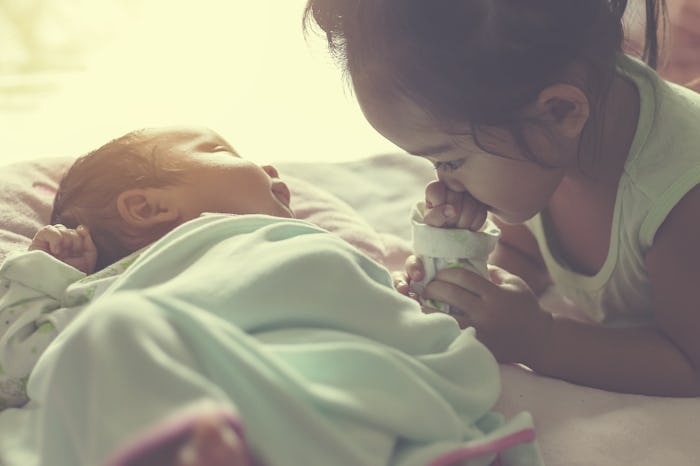Life

Here's The Deal With Toddler & Baby Sleep Arrangements
Space is at a premium these days, with many second bedrooms barely bigger than a closet. So when it's time for your family to grow, it doesn't necessarily mean it will be affordable or possible for your home to grow, too. The decision to have children share a bedroom can honestly seem like the ideal solution. It can also serve to keep toy messes contained, and help your kids to develop a strong sibling bond. But should a toddler be in a crib with a baby? Well, the answer is just as complicated as most sleeping arrangements.
When considering a shared sleeping space for your children, you should know that allowing your baby and your toddler to share a sleep space is not recommended and, for better or worse, doesn't meet baby sleep safety standards. The Maternal & Child Health Bureau recommends babies sleep alone, going on to state, "It is also recommended that infants sleep on a firm sleep surface, without loose bedding, in the same room but not the same bed or sleep surface as parents or other persons."
Even when children are the same age, as in the case of twins, experts still recommend that they are separated and placed in different cribs once they are old enough to move around and interfere with each other. Jennifer Walker, Atlanta-based pediatric nurse and co-author of The Moms on Call Guide to Basic Baby Care, told WebMD, "Newborn twins can certainly remain in the same crib initially. If they sleep better when they know the other is close by, crib-sharing can last up until they move into their childhood beds." Walker goes on to suggest parents of twins "make the switch to two cribs when the twins begin to roll, bump into one another, and wake each other up."
The Newborn Infant Nurse Review advises that babies and children should not be sharing a sleeping space and that incidences of Sudden Infant Death Syndrome (SIDS) are reduced when parents follow safe sleeping practices, stating "co-bedding is discouraged."
The Newborn Infant Nurse Review does note, however, that sometimes families face socioeconomic barriers to following all of these safe sleep measures, especially when they have twins. "Co-bedding may be a necessity for families who cannot afford the additional furniture required to provide separate sleeping areas for their multiple birth infants."
Even if you don't intend to let your toddler and baby sleep together in a crib, it can sometimes seem convenient to put them both in one space while you try to get things done around the house. Once they are both contained, you can tidy up, vacuum, or deal with the normal mess that comes with having two or more kids.
This might also not be a wise decision, however. Toddlers can be rambunctious and active, as any parent of a toddler knows, and might find it fun to bounce and run around the crib. Those seemingly harmless actions could be very dangerous for a small baby. Toddlers also usually have a few soft toys or lovies in hand, and these could pose a suffocation risk to smaller babies.
It's perfectly normal for toddlers to feel some resentment towards a new baby who may be getting all the attention. That's why parental supervision is required at all times when babies and toddlers are together, and why they should not be sharing a crib.